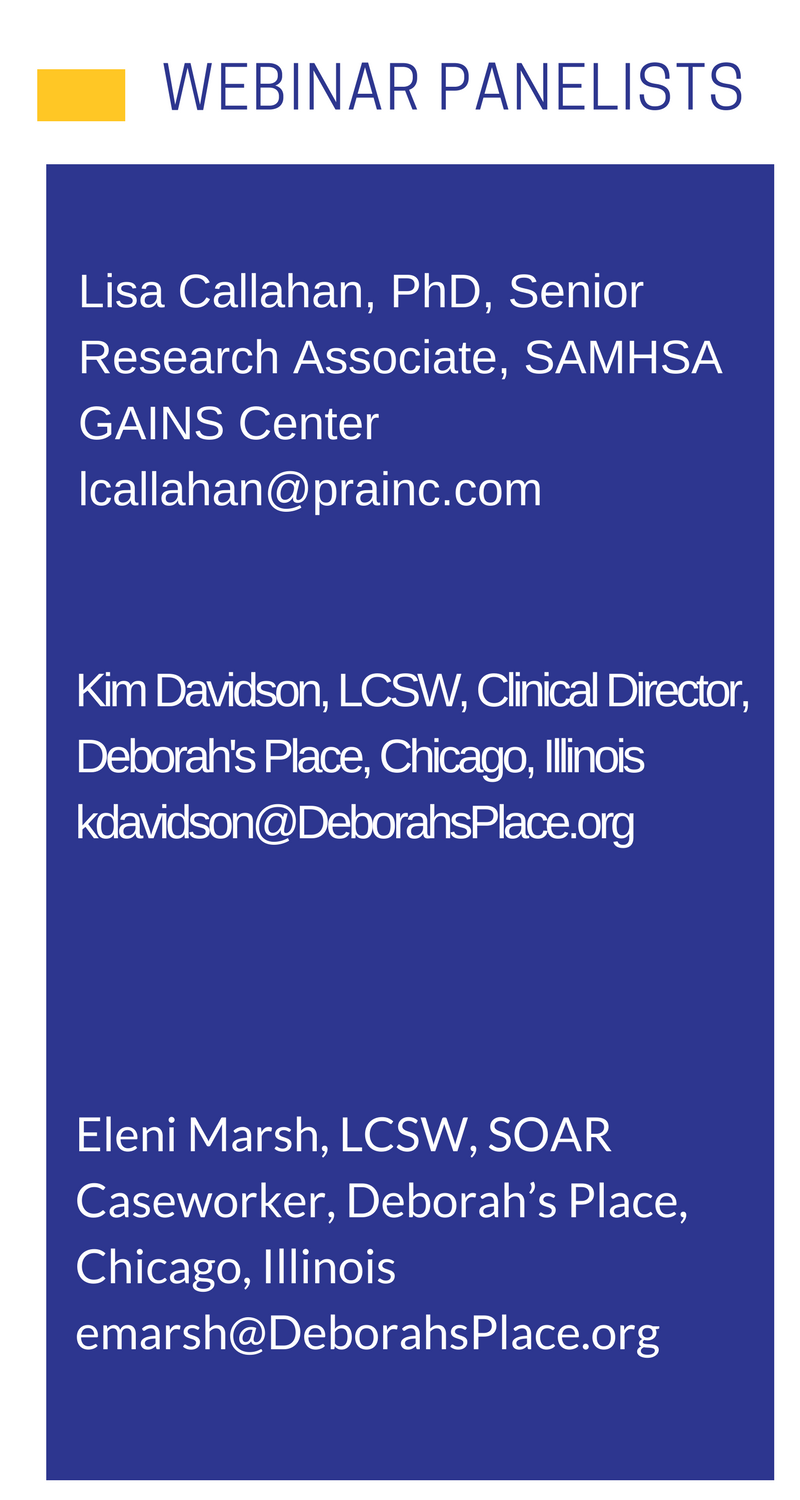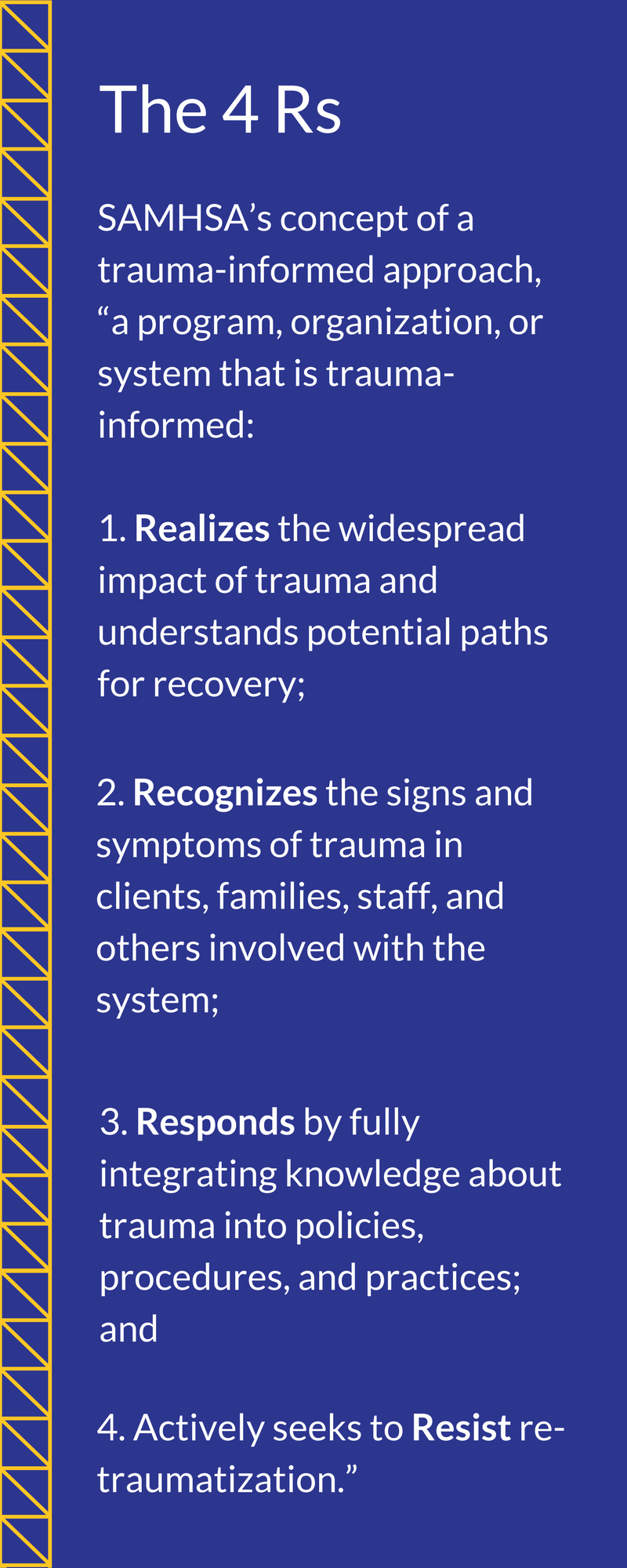SOAR TA Center Webinar Recap Part 1: How to Improve SOAR Applications with the Essentials of Trauma Informed Care

On March 23, 2017, the SAMHSA SOAR TA Center hosted the Improving SOAR Applications with the Essentials of Trauma Informed Care webinar. In this webinar, trauma-informed experts and SOAR providers shared best practices for understanding and implementing trauma-informed care principles. In this two-part blog series, we'll review the major takeaways of the webinar and provide the six key principles of a trauma-informed approach!
What This Webinar is Not About!
Remember, the SOAR practitioner is not being asked to provide therapy. Although, your interactions may be therapeutic, you are not providing treatment. Dr. Lisa Callahan, Senior Researcher with SAMHSA’s GAINS Center, began by sharing how human service providers should approach people we come into contact with through our work. Dr. Callahan says,
“Always approach people with the safe, universal assumption that this individual has experienced trauma; because, we don’t know the nightmare they may have lived before. For instance, we don’t know what riding public transportation may trigger, and we don’t know that sometimes by just ‘talking’ we may make things worse. Our approach is not to get SOAR applicants to ‘relive’ their trauma by talking it through, because talking about the trauma, even just trying to put what happened into words, can actually worsen an individual’s trauma by re-activating it in the brain, and embedding it deeper. In times under intense stress our systems shut down.” – Dr. Callahan
Listen to the webinar recording to hear Dr. Callahan discuss how trauma affect the brain. Learn about what Dr. Callahan calls the “lizard” brain.
What Does it Mean to be Trauma Informed?
SAMHSA has been the lead federal agency in incorporating trauma-informed practices into all of its programs, which includes SOAR. Access more information on SAMHSA’s concept of trauma and learn guidance for a trauma-informed approach.
Traumainformed care is an approach to social service delivery that has been defined as “grounded in an understanding of and responsiveness to the impact of trauma that emphasizes physical, psychological, and emotional safety for both providers and survivors and that creates opportunities for survivors to rebuild a sense of control and empowerment.” Dr. Callahan shared that many social services have begun to adopt “trauma-informed care” approaches, which take into account the widespread impact of trauma, recognizing its signs, responding by integrating that knowledge into practice, and seeking to avoid re-traumatization.
The American Psychological Association (APA) defines trauma as “an emotional response to a terrible event, like an accident, rape, or natural disaster.” The APA notes that “immediately after the event, shock and denial are typical” and that “longer-term reactions can include unpredictable emotions, flashbacks, strained relationships, and even physical symptoms. Responses to traumatic events may occur shortly or a long time after an individual experiences the traumatic event and will vary depending on the individual.
Why Become Trauma-Informed?
“There has been a lot of interest in learning about trauma”, remarks Dr. Callahan. “Research and experience tells us that histories of traumatic experiences are prevalent for individuals who have experienced homelessness, mental health challenges, or substance-use conditions”, states Dr. Callahan. Given the high prevalence for all three issues in the SOAR target population, integrated trauma-informed approaches are needed for SOAR providers! Dr. Callahan describes three global reasons on why trauma is being discussed throughout the service systems: science, money, and politics. Science has dramatically changed what we know about the brain, physical and emotional trauma, exposure to trauma, and how trauma can have an impact on the brain. Dr. Callahan reminds us, “we know people can and do recover from trauma, and we want to provide services and environments that support healing.” To be a “trauma-informed” provider is to root your care in an understanding of the impact of trauma and the specific needs of trauma survivors, while seeking to avoid causing additional harm to those we serve.
 How can SOAR providers help care for people who have experienced trauma?
How can SOAR providers help care for people who have experienced trauma?
In this webinar, we shared best practices for trauma-informed care. These include understanding trauma and its effects, creating safe physical and emotional space, supporting choice and control, and integrating trauma-informed care across service systems.
Additionally, people who lack housing experience the loss of place, safety, stability, and community. These losses are also traumatic. They have a major impact on how people understand themselves, the world, and others. People who have experienced multiple traumas do not relate to the world in the same way as those who have not. They require services and responses that are uniquely sensitive to their needs.
Without an understanding of trauma, providers may view those they serve in negative ways. Providers might describe behaviors as “manipulative,” “oppositional,” or “lazy.” Yet these behaviors may be better understood as strategies to manage overwhelming feelings and situations. Trauma-informed training can help providers understand these responses and offer trauma-sensitive care.
Educating providers on traumatic stress and its impact is essential. Trauma survivors, particularly those who have experienced multiple traumas, have developed a set of survival skills that helped them to manage past trauma. These survival strategies (like substance abuse, withdrawal, aggression, self-harm, etc.) make sense given what people have experienced. But they can be confusing and frustrating to others and often get in the way of current goals, such as applying for Social Security benefits. Understanding trauma and its impact on current functioning is key to how SOAR providers approach SOAR applicants to obtain this necessary information for the purpose of proving disability.


